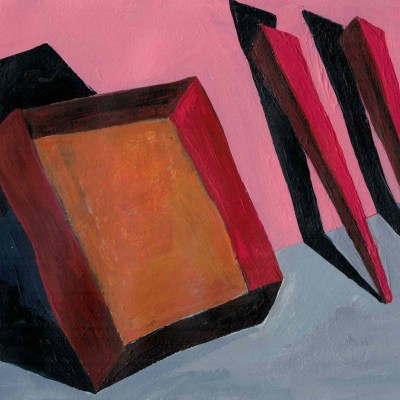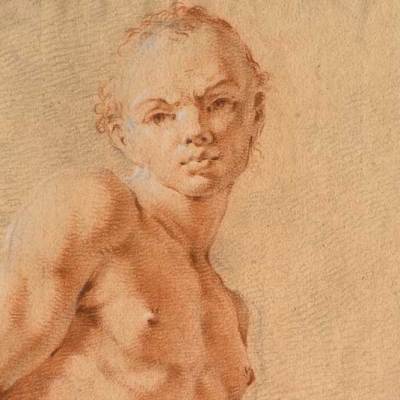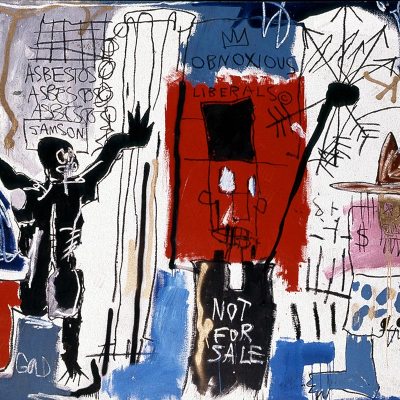From the March issue of Apollo: preview and subscribe here
The Salon du Dessin has long been celebrated as the world’s premier marketplace for drawings, attracting both private buyers and international museums to Paris every spring. As the 24th edition prepares to open at the Palais de la Bourse, Apollo picks out highlights from the fair and from its array of satellite events
Vincent Van Gogh believed that drawing was ‘the root of everything’, but 125 years after his death he is popularly remembered for his paintings. His early charcoal study, Backyard with two figures (1882; Arturo Cuéllar) is a fine reminder of how the artist’s work on paper informed his oils: its loose hatching prefigures his distinctive directional brushstrokes, and he would return to similar subjects throughout his short career. Paul Gauguin, who spent two disastrous months with Van Gogh in Arles in 1888, is also represented at this year’s Salon at the stand of Jean-Luc Baroni. The artist’s enigmatic mixed media illustration of three women, Nègreries Martinique (1890), was inspired by a trip he made to the island in 1887, but also foreshadows his Tahiti paintings. At Damien Boquet Art, a small pastel on monotype by Gauguin’s Parisian contemporary Edgar Degas (The duo, c. 1876–78) is just as enigmatic: Degas’ depiction of a woman turning away from a man as they sing together is characteristically psychologically ambiguous. Egon Schiele’s exceptionally controlled black chalk drawing of a Couple Sleeping (c. 1909; Le Claire Kunst), by contrast, feels like a far cry from the tortured figures that featured in the Courtauld Gallery’s recent exhibition of his drawings and watercolours. Maggie Gray
Among the events to coincide with this year’s Salon (as part of the Semaine du Dessin) is a private view of a selection of Jean Gorin’s architectural drawings at the Centre Pompidou (25 March). From 1926, the Nantes-born Gorin followed Piet Mondrian’s directive – to distil art to its essential elements, as expressed in bold horizontals and verticals, and blocks of primary colour – and became a disciple of neoplasticism. At the Palais de la Bourse meanwhile, the Salon itself offers many opportunities to consider the varying pathways of 20th-century abstraction. František Kupka’s Abstract Composition (Galerie de la Présidence) is dated to around 1930, just before he became a founder-member of the Abstraction-Création group; its floating planes of watercolour demonstrate just how far he had travelled from figuration. Ahead of this year’s Tate Modern survey of her work, Galería Guillermo de Osma offers an early Sonia Delaunay colour experiment (Album, 1916), while on the stand of Applicat-Prazan Serge Poliakoff’s 1958 Composition (red, green, white, black) illustrates just how much Delaunay’s emotive approach to colour influenced the work of later artists. Finally, don’t miss Jean Dubuffet’s Tea Cup (1967; Galerie Antoine Laurentin), a felt-tip drawing with segments blocked out in red, white and blue: though its geometry is wonky, it has Mondrian written all over it. Imelda Barnard
This year marks the bicentenary of the Städel Museum, so it seems apt that visitors to Paris in March will have an opportunity to admire some of the greatest drawings from its collection at the Fondation Custodia. ‘Raphael, Titian, Michelangelo: Italian Drawings from the Städel Museum in Frankfurt (1430–1600)’ (21 March–21 June) includes a range of preparatory drawings, studies and finished works, and stretches from spindly north Italian gothic standing figures to a louche reclining Narcissus by Cavaliere d’Arpino. As ever, there will also be many fine Italian drawings on offer at the Salon itself: Pandora Old Masters brings a graceful profile of a woman (c. 1550), in black chalk on blue paper, by the 16th-century Lombard painter Bernardino Lanino; first-time exhibitors Galerie Tarantino show a delicate Sleeping Putto (1715–20) by the great Emilian draughtsman Donato Creti, depicting a boy who, having nodded off at his studies, has slumped into what feels more like a grown-up pose. Also new to the fair is Marty de Cambiaire, whose highlights include a red and black chalk Study of a seated male nude by Giambattista Tiepolo, in which the power of the figure’s musculature is enhanced by the artist’s low vantage point. A dramatic religious scene by Tiepolo’s son, Giandomenico, depicting The betrothal of the Virgin Mary (1792), is presented by Galerie Éric Coatalem. Thomas Marks
The Salon’s guest of honour this year is the Bibliothèque Nationale de France, which is bringing a selection of architectural drawings from its prized collection. Alongside the highlights from the visionary ‘paper architects’ Jean-Jacques Lequeu and Étienne-Louis Boullée are quicker studies by practitioners such as Alexandre Brongniart (designer of the Salon du Dessin’s home, the Palais de la Bourse) and René Binet. Sticking with the architectural theme, Galerie Paul Prouté brings a Study of stained glass panels for Gabriel Pierné’s Paris Apartment (c. 1885) by Luc-Olivier Merson – a reminder that the history painter was also an accomplished draughtsman and sought-after interior designer. Carlo Marchionni’s Ideal view of a gate with two figures (c. 1755), at Galleria Carlo Virgilio, is an intriguing scene of a couple courting or plotting before a rococo gate; Simon Bussy’s 1928 pastel of The temple of Khonsou at Karnak is, by contrast, entirely empty of people and focuses on the temple’s massive columns (Galerie Mathieu Néouze). Equally deserted is the scene in Léon Spilliaert’s L’estacade (1907), a gloaming view of a floating barrage, which is brought to the fair by Patrick Derom Gallery, specialists in Belgian symbolism. Fatema Ahmed
Salon du Dessin is at the Palais de la Bourse, Paris, from 25–30 March.
Click here to buy the latest issue of Apollo
Related Articles
An Aura of Unease: Egon Schiele at the Courtauld Gallery (Nadia Connor)






